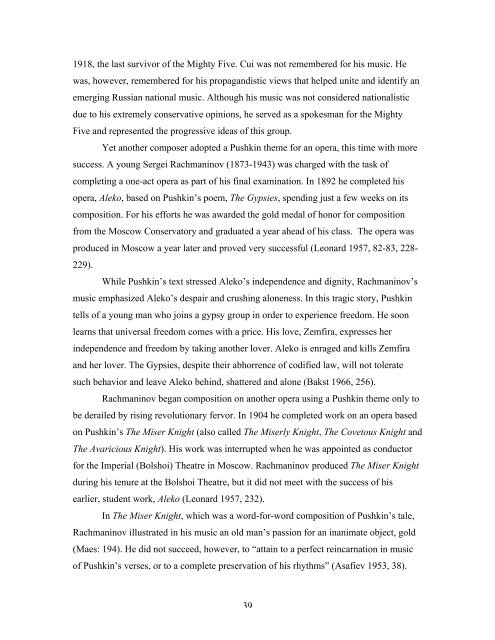Alexander Pushkin's Influence on Russian Ballet
Alexander Pushkin's Influence on Russian Ballet
Alexander Pushkin's Influence on Russian Ballet
Create successful ePaper yourself
Turn your PDF publications into a flip-book with our unique Google optimized e-Paper software.
1918, the last survivor of the Mighty Five. Cui was not remembered for his music. He<br />
was, however, remembered for his propagandistic views that helped unite and identify an<br />
emerging <strong>Russian</strong> nati<strong>on</strong>al music. Although his music was not c<strong>on</strong>sidered nati<strong>on</strong>alistic<br />
due to his extremely c<strong>on</strong>servative opini<strong>on</strong>s, he served as a spokesman for the Mighty<br />
Five and represented the progressive ideas of this group.<br />
Yet another composer adopted a Pushkin theme for an opera, this time with more<br />
success. A young Sergei Rachmaninov (1873-1943) was charged with the task of<br />
completing a <strong>on</strong>e-act opera as part of his final examinati<strong>on</strong>. In 1892 he completed his<br />
opera, Aleko, based <strong>on</strong> Pushkin’s poem, The Gypsies, spending just a few weeks <strong>on</strong> its<br />
compositi<strong>on</strong>. For his efforts he was awarded the gold medal of h<strong>on</strong>or for compositi<strong>on</strong><br />
from the Moscow C<strong>on</strong>servatory and graduated a year ahead of his class. The opera was<br />
produced in Moscow a year later and proved very successful (Le<strong>on</strong>ard 1957, 82-83, 228-<br />
229).<br />
While Pushkin’s text stressed Aleko’s independence and dignity, Rachmaninov’s<br />
music emphasized Aleko’s despair and crushing al<strong>on</strong>eness. In this tragic story, Pushkin<br />
tells of a young man who joins a gypsy group in order to experience freedom. He so<strong>on</strong><br />
learns that universal freedom comes with a price. His love, Zemfira, expresses her<br />
independence and freedom by taking another lover. Aleko is enraged and kills Zemfira<br />
and her lover. The Gypsies, despite their abhorrence of codified law, will not tolerate<br />
such behavior and leave Aleko behind, shattered and al<strong>on</strong>e (Bakst 1966, 256).<br />
Rachmaninov began compositi<strong>on</strong> <strong>on</strong> another opera using a Pushkin theme <strong>on</strong>ly to<br />
be derailed by rising revoluti<strong>on</strong>ary fervor. In 1904 he completed work <strong>on</strong> an opera based<br />
<strong>on</strong> Pushkin’s The Miser Knight (also called The Miserly Knight, The Covetous Knight and<br />
The Avaricious Knight). His work was interrupted when he was appointed as c<strong>on</strong>ductor<br />
for the Imperial (Bolshoi) Theatre in Moscow. Rachmaninov produced The Miser Knight<br />
during his tenure at the Bolshoi Theatre, but it did not meet with the success of his<br />
earlier, student work, Aleko (Le<strong>on</strong>ard 1957, 232).<br />
In The Miser Knight, which was a word-for-word compositi<strong>on</strong> of Pushkin’s tale,<br />
Rachmaninov illustrated in his music an old man’s passi<strong>on</strong> for an inanimate object, gold<br />
(Maes: 194). He did not succeed, however, to “attain to a perfect reincarnati<strong>on</strong> in music<br />
of Pushkin’s verses, or to a complete preservati<strong>on</strong> of his rhythms” (Asafiev 1953, 38).<br />
39

















